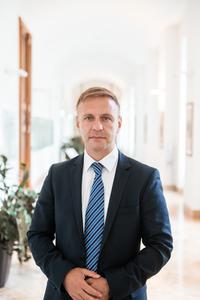Gökhan Yazici
Accociate Professor of Department of Civil Engineering, Faculty of Engineering, Istanbul University-Cerrahpasa. Field of expertise: disaster management, with particular regard on earthquake disaster management and structural resilience.
Summary of Gökhan Yazici 's lecture is available HERE and HERE.
What inspired you to apply for the grant?
I was inspired to apply for the Ludovika Scholars Program due to its distinctive mission of integrating academic excellence with public service. The program’s interdisciplinary structure—encompassing areas such as disaster management, national safety, public governance, and education—aligns closely with my academic and professional interests. As a researcher focusing on earthquake engineering and disaster resilience, I was particularly motivated by the opportunity to share my experience in post-earthquake recovery and disaster management in Türkiye, while learning from colleagues working in related fields. I also value Ludovika University of Public Service’s dedication to preparing professionals who contribute directly to the well-being and safety of society.
What do you expect to gain from the Program?
I anticipated gaining valuable insights into how disaster management strategies are developed, implemented, and coordinated within different national contexts, particularly in Eastern Europe. Engaging with colleagues from the Disaster Management Institute allowed me to learn about their institutional structures, training systems, and best practices in risk reduction, emergency response, and community resilience. These discussions provided comparative perspectives that were highly relevant for my ongoing research on post-disaster reconstruction and sustainable recovery in Türkiye.
In addition, I expected to enhance my academic and institutional network by establishing collaborations that could lead to joint research projects, conference participation, and future exchanges of expertise. The program also offered an important opportunity to observe how Ludovika University of Public Service integrates education, training, and policy in fields such as national security, water management, and public governance. Such exposure broadened my appreciation of how interdisciplinary education contributes to strengthening public institutions and improving societal resilience.
Beyond the academic and professional gains, I was deeply inspired by the inclusive and collegial atmosphere of the university. The warm hospitality extended by the Ludovika community, along with the opportunity to meet with Rector Professor Dr. Gergely Deli, Vice Rectors Major General Dr. László Kovács and Professor Pier Paolo Pigozzi, Ludovika Scholars Program Director Éva Sőregi-Vilén, Professor Dr. Ágoston Restás of Disaster Management Institue, and other university administrators—who generously took the time to engage with the scholars—exemplified the institution’s strong commitment to fostering meaningful academic exchange. Overall, the experience fulfilled my expectations and offered valuable intellectual growth, cultural enrichment, and the foundation for long-term professional relationships that will continue to enrich my research and teaching activities.
How does this grant contribute to your professional development or career goals?
The Ludovika Scholars Program has significantly contributed to my professional development by enhancing my understanding of how academic research can inform policy and practice in disaster management. The grant enabled me to share my professional experience in earthquake-affected regions and to exchange knowledge with academics and practitioners from diverse disciplines. Furthermore, it allowed me to establish valuable academic and institutional connections, particularly with colleagues and public officials from Eastern Europe, who face similar challenges to those in Türkiye. This experience has strengthened my commitment to advancing interdisciplinary and internationally collaborative research aimed at improving resilience and sustainability in the built environment.
